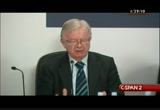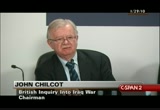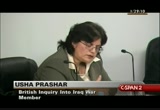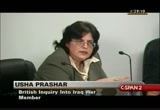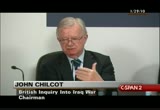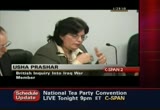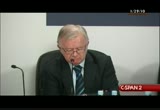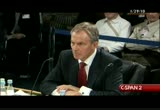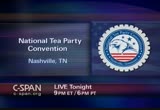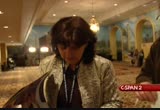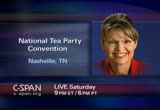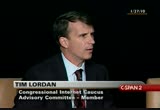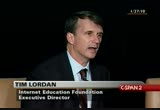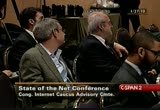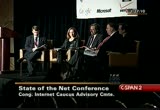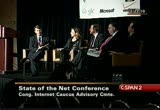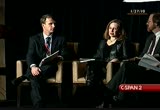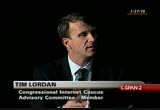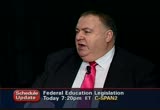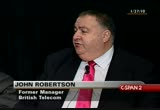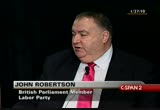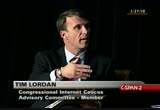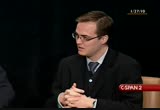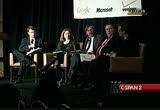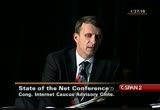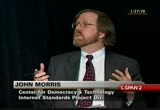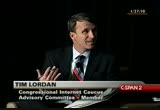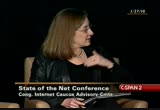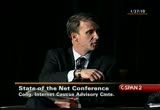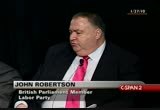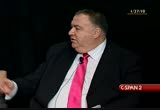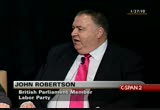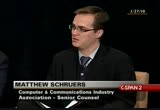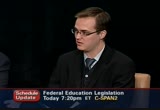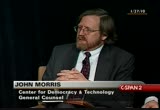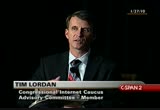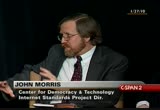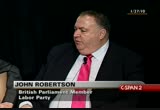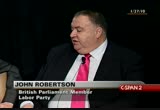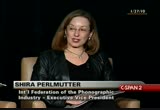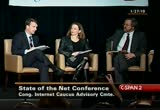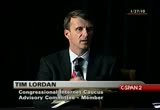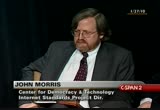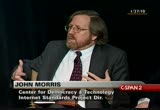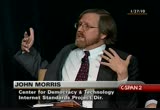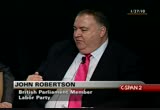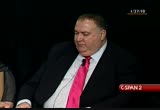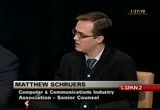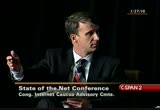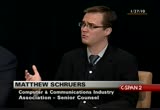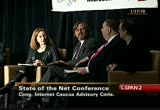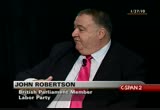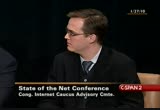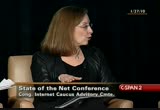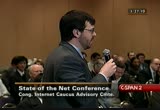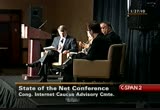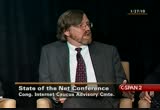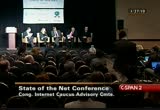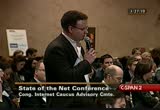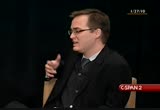tv U.S. Senate CSPAN February 5, 2010 5:00pm-7:00pm EST
5:00 pm
it is true it was at a later time that clear short herself joined the committee, however having said that we are in pretty regular correspondence and as i say in the end dfid acquitted itself in a perfectly well and the problem wasn't capable of being cured by dfid. >> that's true but at an early stage affected planning to go ahead medieval departmental engagement, probably cabinet involvement. why wasn't the treasury and the dfid involved in the early stages? moment, the single most important areas were diplomacy and were the issues to do with military planning. i know much has been made at the add hock meetings with the large
5:01 pm
age. the key players were there to have a proper discussion and take the decisions necessary. that's what we did before and afterwards. >> that's true, but he said i think you should include even if you would be difficult. in a way if you look at the aftermath reconstruction, you had the lockers. . all i would say is we had the key players and there was a constant interaction. in so far as we were predicting, we mad >> we made provision for it and the relationship between myself and jack straw and geoff hoon, politicians, but also the chief of defense staff were close.
5:02 pm
we were in close interaction the entire time. the main bulk of this was going to be done in the first instance by the military. now it's correct as we got into late 2002, early 2003, dfid became a part of the picture. clare short wanted to conduct immediate. that was fair enough. the issue however that dfid was focused on was the humanitarian side. and to be heard they did a good job on. >> as you mentioned the bug report, -- >> i sat on the but what we to want to go over old ground. that just to be clear, the cabinet frugally in the period 2002 and three, not that they were not consulted but rather papers in general i think were not circulated, the butler committee found on. and we haven't found any. which has given rise to the question, was there the sufficient information analysis, both of the issues and about the background? today, your cabinet colleagues,
5:03 pm
to understand and if necessary challenge within cabinet discussion? >> we had i think, i think it's 20 -- i think there was at least 25 preinvasion cabinet discussions on iraq. and then was ad hoc ministerial discussions, i think 28 of those. there was a constant interaction, and people would describe, it wasn't just a sort of formal cabinet discussion. jack straw would take people through the information that we had. there was an immense about going on inside the m.o.d., inside the foreign office. actually inside dfid as well. and i really don't think any of the members of the cabinet at the time felt they weren't in baltimore felt they couldn't challenge. indeed, robin cook didn't get robin and i disagreed about it in the end. and so obviously these issues to
5:04 pm
do with the nature of the meetings that were held, but i was in an almost constant interaction for 2002 and 2003 with members of the cabinet. >> you do have both from two different witnesses that we've taken test was from, alastair campbell and lord turnbull. the same thought that you need to accommodate difference of view and respond to it within a collective, with in this case the cabinet or some smaller group, the ad hoc committee for example. with hindsight, do you think there were sufficient space and opportunity for those differences to be accommodated and fitted to the final judgment? >> i really do, actually, yes. nobody in the cabinet was unaware of what the whole issue was about. it was the thing running about
5:05 pm
the whole of the planning of the mainstream at the time. and the work members of the cabinet who would challenge and disagree, but most of them agreed. it was the same with parliament. i was subject constant number of peoples telling you shouldn't do this, you shouldn't do that, you should do differently. and so on. and in relation to the point afterwards, i mean, whatever else difference is clare short and i'm a fat from time to time, the one thing i would never accuse her of being is backwards in coming forward. there was a huge all the time and action, as i say, between people on the very issues. >> thank you. i think we'd like to explore just one other aspect of this, and that's the interaction between major strategic policymaking at cabinet level. and folding into that, the key legal advice. we're not going to go over the ground we've already covered earlier today. there is a set of questions we
5:06 pm
just like to assume. and starting with you, baroness prashar. >> thank you. we discuss with lord goldsmith, yeah, the process which he was involved in this decision-making process. and what became very clear during the time, particularly before july 2002, ministers were making public statements. i think you had geoff hoon and he saw a level of that mr. straw had made to colin powell and he was having to constantly write and tell them they should be seeking his legal advice. do you think the fact that he had to respond to people making statements without being clear, do you think i could've been avoided if the attorney had been able to discuss issues in the cabinet and that would have actually insured that the former advice of the attorney would have been preempted?
5:07 pm
>> i think the very first paper we got on this back in march are the clutch of papers we got, in march 2002, which were seen obviously by jack -- i mean, the legal paper was provided by jack straw department, and by geoff hoon as well, was having fully aware of all this. people had the basic legal framework. now i think it's perfectly good for peter goldsmith as the attorney general, and his own pollution, if he thought someone was saying thing that could be justified as on in legal terms. he had gotten on the phone and don't do it or written them a note and said, come back into line on this. which i think they get. i don't think would've made a great deal of difference to have the cabinet. what he needed to be able to do was be in a position feeling sufficiently confident, which he did, to be able to intervene and say i don't agree. >> but the impression got that he was constantly having to ask
5:08 pm
what to write his opinion and provide his opinion, and he said he was and always welcome. >> i think he said that about the particular thing he gave at the end of july. it wasn't so much as a cigarette it wasn't welcomed. you know, i was a with already difficult situation, and now i had another issue to take account of. i to take account of it rightly. and he was completely right to do it. because it made a difference the way we approach 1441. and the resolution there. but you think would have me, so, i'm very happy to talk about how, for now, you know, you might do some of these things different now. but i honestly don't think having peter at the meeting. what would've made a difference with him having the conference to be able to say, as he should as an independent attorney as it were for the government, to pick up the phone and even to the prime minister, which he did, say this is what you can say and what you can't.
5:09 pm
>> but that doesn't allow for a collective decision making with his proper consideration of different options and so one. >> well, i think in respect of the legal opinion, baroness, i think the key thing really was this. the cabinet weren't interesteinterested in becoming part of illegal debate. they just wanted to know is the attorney general saying it is lawful or it's not that i think in respect to these other issues, and there were actual debates about this. there was a debate for example in generally 2003, a fire like it. it was not just about the diplomatic issues, but specifically on the humanitarian and aftermath questions in cabinet. >> but going back to the legal advice, when the cabinet met on the 17th of march, i think lord goldsmith presenter gaffes by ted draught, but there was no discussion on this legal advice. and we have seen the report of a discussion that he had with mr. straw the 13th of march in which he was persuaded not to
5:10 pm
present a finding balance paper. but to actually, given, present his paper which is going to be his parliamentary question. and i think clare short made clear she wanted to discuss it and know whether the attorney general had changed his mind. no discussion took place spent the whole purpose, the whole purpose of having the attorney there at the cabinet was so that he could answer anyone's questions about it. >> but he did say the legal basis is essential but not sufficient. so in that sense, the raw implications of invasion, i mean, should they not been discussed? >> the broader implication in terms of what it was right or wrong to do it? i mean, that was in the sense the purpose of the cabinet discussion. it's perfectly the legal issues were one aspect of this, but i think once the members of the cabinet -- members of the cabinet were really focused on
5:11 pm
the politics, and indeed even robin cook, his attitude was if you get a second resolution, then i'm with you. but if you can't than politically i think this is too difficult. so you know, we were very focused on those political as well as legal questions. >> without not allow them to weigh up the risks for themselves, for the civil servants and so on? i mean, -- >> they were weighing the risks up for the country. but i don't think the respective of the law as it were, i don't think members of the cabinet wanted to have a debate with -- peter was there and could've answered any questions they had, but their basic question to him was, is the proper legal basis or not, in his answer was yes. we said and this is the reason we help you there, and i think any future situation is sensible to have the attorney there. but we offered, in a sense we offered him a picky with the lord there to talk about it.
5:12 pm
>> mr. blair, do you think there's a contrast of approach between what frequent habit of government at all levels, including at the top, that in forming policy you engage in legal advice because it may need expression in statute or comply with existing law, you've followed the legal advice to the pro-policy legal process. that's one advice. and in the iraq case, high end strategic objective. then as it were, work around or through and with the constraints and opportunities that legal advice then gives? do you see a difference of approach there? >> i think there could be, but i was in the situation, since march 2002 was the time when you sit the first framework for this. the legal advise was one of the key things we asked for. and we got it. and that legal advise, it's interesting to go back and look at it, it was legal advise that
5:13 pm
was saying you needed a fresh resolution. and one of the reasons why we went down the path was to give a fresh resolution. one of the things, and this was part of the debate that happened there, was i felt when we got a fresh resolution, so why is the still in the problem. but then i was told what the problem was. >> it still seems more we've heard most today, and from previous witnesses, that there was a very clear strategic policy objectives set for iraq, which was to bring about compliance with united nations resolutions, this armament, and in fact made regime change by military means, that was the last resort but not ruled out. but there were moments very, very late in january, favorite, march in 2003 and policy objective could have been blocked i failure because of the legal constraint. is that unavoidable in situations like this?
5:14 pm
>> well, i think it's unavoidable in a situation where that controversial and divisive, and it is that, you know, that open to challenge. you see, there actually could've been a major debate about kosovo. and look out of. there could have been. there was a because in the end most people went along with the action. they agreed with what we were doing. the truth is, the politics follow quite closely. and i think necessary in the situation where we were setting our strategic objectives, you know, we had this strong belief, and as i say this is my belief now, too, that this threat had to be dealt with with a certain amount of urgency. and we had our alliance with the united states of america, and so on, and all the issues to do with saddam. and an obvious at the same time,
5:15 pm
as you are proceeding and strategies evolving, diplomacy is evolving, you are looking at issues to deal with legality. >> i think which is like a ask one or two more questions before we come to the close. >> my final question, mr. blair, is really about the effect of government. because there would be sort of a long command chain because if you look at the top decision-makers in london, working with soldiers and civilians alike to deliver, locally in iraq, it's quite a complex operation. and many of these issues were across departmental and therefore, quite a new operation had come together. how did you hold your states account for delivery? because delivery was your mantra at that stage. i mean, how did you make sure that what was to be delivered was being delivered ineffectively on the ground?
5:16 pm
>> in a prewar part, we had the ad hoc group of on iraq officials which meant from september onwards, and that includes all the relevant departments. i was cheering the ad hoc ministerial discussions, and as i say i think we had 28 of those needs. afterwards we had the war cabinet and in meetings, and then jack straw became the effective chairman of the ministers and the officials driving for policy from that front. there wasn't an issue really at any stage of this with people not getting they were part of this, apart from the one issue to do with claire and ad hoc committee, which as i say was resolved and i think early 2003. >> tim cross said to us it was reporting back and driving this day today, because what we're hearing from the ground. i mean, this was tim cross is
5:17 pm
common to us. >> yes, and i think one of the questions, this has been raised in some of the evidence do you, is again, if we knew then what we know now, would you want perhaps to put a specific cabinet minister in charge of all this. all the things were looking at. and the only thing i would say to you is that we were partly through my own personal involvement, but also because you had mike boyce and the chiefs of staff committee, you had the officials mean, you had david manning very closely involved in this. i can't really think, and i think turnbull said this in his evidence, there is a machinery of government problem in the sense that if we had different machine and we would've acted carefully. i don't think, but that's the judgment smack one thing i want to put you, because david who we saw lastly, he said he emphasize importance of decision-making.
5:18 pm
so simply not swept away with the pace of events in a particular military preparations. do you think we have the ability and the will to pause and look at our strategy? for example, in early 2003, the inspectors have returned to iraq and were expecting either so damn to of struck them, but he was quickly find evidence of weapons of in the bmd. indy that this didn't happen. did we actually think that we would stop and reevaluate on strategy at that stage the? we would have an entirely real value in our strategy had as i say, and i'm just using this as a short, saddam is saying i'm finished with all this, i want to join the international community on proper terms. but he didn't. and what he did, this is where as i said the iraq survey group and forcing people only look at one part of their findings, and not the other part of the funnies that he never had any
5:19 pm
intention of complying because he had the intention, once again sanctions out of the way, of restarting it against. >> even later it became clear that our efforts were becoming strategic failure. did we think at that stage because the impression one gets in responding to events on the ground. was there any rethink? >> absolutely. the reason we were were in a constant very quickly after the conflict was because what we were funny. then as i say, there was this whole struggle really and battle, when you know, the aged and iran elements became uppermost and it really did change into a different type of fight. and one of the interesting things for example, kimberly kagan does this in her book on the search and it's important because in the end that is what worked. and what nobody foresaw was iran would actually end up in fact supporting a.q. that everyone,
5:20 pm
the conventional wisdom was these two are completely different types of people, because iran is shia, the al qaeda people are sunni, and therefore, the two would never mix. what happened in the end was that they get. because they both had a common interest in destabilizing the country. and for iran, i think the reason they were interested in destabilizing iraq was because they worried about having a functioning majority shia country with a democracy on their doorstep. and for al qaeda, they knew perfectly well the whole mission was to try to say the west was oppressing islam. it's hard to do that if you replaced tyrannical governments with functioning democracies. >> so from your point of view, you think the shiite government worked? >> well, i can't think -- i doubt you have a different regime raise but we did have a machinery of government that
5:21 pm
work and work effectively in order to analyze problems we were likely to face and how we dealt, we would deal with them. and as i say, i think no doubt there were other ways it can be done spent on reflection there was nothing you would do differently? >> i think what you look back now, and i just had too early, for example, if you want to look at maybe putting a specific cabinet minister in charge of this, there were all sorts of things that if you do then you know now, i have been through the whole reconstructed piece. but in terms of what we need at that time, we had a machinery of government that was perfectly foreign. as i said 25 separate cabinet these, 24 ad hoc or 20 ad hoc committee meetings. regular weekly meetings. now you could put them with a capital a. and a capital h. but i don't think it would have made a different were the essential decision-making. >> we're coming to the end, i think, mr. blair.
5:22 pm
and i've got a couple of questions i'd like to raise. i think the first is to look at the perspective of the whole enterprise from the standpoint of the people in iraq. the coalition went in as liberators. rather soon, they began to be rescinded, on parts of the opposition and an attack by occupiers by some. by the time, for example, british forces withdrew from gaza city to the airport, 90 percent of the attacks they were against them as between members of the shia factions. so do you think looking back from 2010, the people of iraq thought the enterprise was worthwhile? and just as one piece, not of evidence, a very senior constitutional iraqi said clearly it was good that saddam is gone.
5:23 pm
the inept nature of some the things the coalition did, coalition, not british specifically, has caused great suffering. so price was high. >> it's too early to say right now where the the iraqi democracy will take root and will function effectively. although as i think john jenkins and frank baker said to you, and there are really signs. and just do say some of the things that i think have taken place in iraq today. if you look, for example, as the electricity, you look at income ahead which is several times ahead under sedan, you look at now the money that's being spent on infrastructure. i think yes, it was very, very difficult fight in deed.
5:24 pm
it was always going to be difficult once these extra factors came into play. i think and iran. but when you go into a nationbuilding situation in the future, i think we will be far better prepared and better educated than we were then. i would just give one -- if we are talking about, unicom was it worth in terms of the iraqis themselves, if you look at the latest information from the brookings institute and the polls they are doing about the right direction, wrong direction to their country, they're actually upbeat about the future. you know, if you look at whether they believed that security and services are getting better, a majority of them think they are, despite all the trouble, despite the fact these terrorist carry on. let me just give you one example of where i think you can see both the nature since we're talking about how is it for iraq is, because the iraqis themselves less worried about
5:25 pm
the issues to deal with united nations and so on. they are worried about their country and the oppression. which is focused on moment on what the wish again saddam regime was like that in 2002001 and 2002, they had a child mortality rate of 130 per thousand children under the age of five, worse. that was despite the fact that saddam had as much money as he wanted for immunization programs and medicines for those children. that equally to roughly about 90,000 deaths under the age of five a year. the figure today is not 130. is 40. that equates to about 50,000 young people, children, who as a result of a different regime that cares about its people. that's the result that getting
5:26 pm
rid of saddam makes. and you can talk to iraqis, of course, some will say particular those from the suicide still worried about whether there'll be a will to come into the politics. at some of them may say, well, i don't believe it was worth it. but i think if you ask the majority of iraqi survey, would you really prefer with all the challenges that life had to be back under saddam, i think you get a pretty overwhelming answer to that question. >> the other perspective clearly, you will appreciate this as anyone can probably, our participation in the iraq conflict has been very divisive here and abroad. has caused the anguished to those who lost people they loved. and some of whom are in this room. there is gratitude, great gratitude, to our armed forces for the sacrifices they made and the bravery they should. but we, like you have also
5:27 pm
experienced it firsthand the angle which is still held by many people in this country. and we've been asking, therefore, the question, why? and so as we conclude today, can i ask what broad lessons you have drunk him you've drawn some already in the course of your testimony, and to say whether you have regrets about key aspects. of the iran complex to? i've said some of things i think are lessons that can be learned. about nation building, i think you got to look very carefully of what type of forces you require because this will be a security situation. that you face a challenge and security situation. i also think you've really got to look at the issue to do with the nature of this threat from al qaeda on the one hand, iran on the other, and the impact that will have not just on iraq,
5:28 pm
but potentially in different arenas right round the middle east region and beyond. and i feel, of course, i had to take this position as prime minister, and it was a huge responsibility been and there's not a single day that passes that i don't reflect and think about that responsibility. and so i should. but i genuinely believe that if we had left saddam in power, even with what we know now, we would still have to have dealt with them, possibly in circumstances where the threat was worse. and possibly in circumstances where it was hard to mobilize any support for dealing with that threat. and i think we live in a completely new security and firemen today. i thought that then. i think that now. that's why i said this a number of times today, i take a very hard, tough line on iran today. and many of the same arguments
5:29 pm
apply. in the end, it wasn't divisive. and i'm sorry about that. and i tried my level best to bring people back together again. but if i am asked whether i believe we are safer, more secure than iraq is better, but our own security is better, with saddam and his two sons out of power and out of office, then in office, i believe in deed that we are. and i think in time to come, if iraq becomes as i hope and believe that it will, the country that it's people want to see, then we can look back in particular our armed forces can look back with an eminent sense of pride and achievement in what they did. >> and no regrets? >> responsibility, but not every great for moving saddam hussein, i think -- >> be quiet, please. >> i think he was a monster. i believe he threatens, not just the region but the world.
5:30 pm
and in the circumstances that we face them, but i think even if you look back now, it was better to deal with this threat, to do with it to remove him from office. and i do genuinely believe that the world is safer as a result. and i know sometimes, because this happens out in the region, sometimes people say to me, well, saddam was a break on iran. that's, let's be clear, there is another view of foreign policy in this instance. which is, if we had left saddam in place he would have controlled iran better. i really think it's time we learned as a matter of sensible foreign policy, that the way to do with one dictatorial threat is not to back another. that actually the best answer to what is happening in iran, is to allow the iraqi people, the freedom and democratic choice
5:31 pm
that we enjoy in countries like ours. >> thank you. this brings us i think to the end of today's hearings. is there any final comment beyond those you've already made that you wish to add before we close? >> no. >> in that case, can i say two things. the first is, clearly our considerable limits to what we can cover in one day, the inquiry still has much work to do. and among other things, our witness today, mr. blair, has drawn attention to a number of dimensions arising out of iran. which i think we shall pursue. can i, with that, thank our witness for a long day of testimony. a long, hard they i think. and thank very much you've been here as witnesses to the session. as to those who are present in the morning session. thank you all very much indeed. now, with that, resume hearings next week on monday at 11:00 in
5:32 pm
5:33 pm
>> thank you for coming. >> can you show me what's in one of those gift bags? back we have stuff in the gift bag. i don't even know what it's for because it has a hole in the bottom of it that it doesn't hold coked. >> we got a t-shirt. >> it won't hold much tea. >> would you hold it up for a? >> yes, i will. so that's nice. of a. you to keep looking? and we've got a fanny pack. that's nice. >> looks like various advertisement. >> and this i can talk to you with. megaphone. >> in a note he got. >> and other paper, t-shirts. do you have your ticket?
5:34 pm
5:35 pm
>> now a forum on internet piracy and copyright issues. this is from a conference hosted by the congressional internet caucus advisory committee. and it is just under an hour and 15 minutes. >> my name is tim lordan. i am the director of the caucus advisory committee. i welcome today to the conference. this panel is the first plenary of the day. it will lead this into three different breakouts.
5:36 pm
mr. robertson from comcast is talking about a bid and piracy and illegal activity on the network. this panel today is called copyright strikes, when as a -- self-images unpack that title, just interesting and strange. some people call this panel graduated response. some people would call this panel three strikes, i guess which is a baseball term. but essentially deals with file sharing on networks is obviously a problem for the content industry. people trading in illegal to obtain an illegal used in fringing copyright material. the content industry is losing a tremendous amount of money this way. the question is how do you do with pirates. over the years, the content industry is been trying to a variety of things. back in 2008, i believe they said they would stop selling
5:37 pm
pirates on filesharing networks. and lou of working with isps to do some type of graduated response. and by graduated response, i assume it means a progression, a series of notices and warnings to stop the activity. ultimately, you know, ending in some kind of hell. i think one thing want do was have a few different experts. there is that process that has been going on, but across the world we've been saying interestingly different laws and regulations in countries like the united kingdom and france, and elsewhere, that deal with final technical measure which would be suspension of internet service. and from the perspective of the congressional advisory committee talking, back in 1996, internet, the internet caucus committee has long promoted the internet as an incredible, powerful committee patients tool.
5:38 pm
that is obvious to us today. i don't think that was the case back in 1986 with jerry and congressman rick white at the time are running around capitol hill trying to get members of congress to use e-mail and put up webpages. but today, the internet has woven itself into the fabric of our daily lives. a panel discussion this afternoon about free expression, dealing with china and some of those issues, and secretary clinton's speech last week have highlighted that. so when someone talks about suspension of internet service, especially today, i think it's something the internet caucus advisory committee wanted to look at, and unpack. so we assume the title that they are indeed pirates. we assume in the title of this panel that they are sentenced to exile. i think those are both functions. but i think what we'd like to do is have our panelists, our expert panel is look at the legislation from across the pond and knows where in the world and
5:39 pm
kind of let's look at this through and american lives and how does legislation regulation elsewhere kind of reflect back on. so with us today, we are very, very lucky and very fortunate. we have two left, we have shira perlmutter executive i've vice president at the international federation for photographing industries. shira was with us before back in 2003 in her capacity with aol time warner on a panel called digital rights management whose rights are being managed. in 2003. next to her is john morse. john also is the director of the internet standards and technology project for the cdt. and next to him is [inaudible conversations] john robertson is a number of the british department house of commons. interestingly, mr. robertson is chair of the all party communications group. i guess we might say that you are the chair of the congressional for your version of the internet caucus over there. and also interestingly, and i
5:40 pm
think important for this panel, you are chairman and secretary of the music group. next to mr. robertson is matthew schruers which is very difficult to pronounce being from boston. i apologized for the. and before that, matt was with forest as an associate. let me jump right into the. we have legislation across the atlantic in the u.k. that is moving through the house of commons, house of lords are now going to the house of commons. introduced by the executive that would require after a certain amount of notices, a series of tactical measures. one of which is downgrading of service, one of which is outright suspension service. in france, we have what we call the adobe call. i don't know what it stands for but the sarkozy law. it was a first version that was struck down as unconstitutional by the courts and came back.
5:41 pm
but essentially there is elements by which a user would be suspended from using internet service. trances, your global policy for the international federation of phonographic industry. can you unpack force what's going on with these pieces of legislation over there? and perhaps even why in these particular countries, legislation regulation by the government is necessary, whether it is the market place or the current regulatory structure. >> i have to say the whole concept of graduated response really was born in france went isps and right holders were put in a room and forced into negotiations by the government. with a mandate to come up with a solution to dealing with peer-to-peer piracy on the internet. and the goal was to come up with an approach that would be better than existing law, which allowed people to be taken to court for what they were doing. and so the goal was to to come up with a more effective and one might say a kinder and gentler approach to dealing with peer-to-peer infringement. and it's really exactly as can
5:42 pm
describe it, they opportunity to have a system that would have warnings and educational opportunities for people who are using peer-to-peer services that would give them an opportunity to stop without suffering any further consequences, avoid being taken to court, and in effect have a privacy protected because right holders would never actually need to get information as to who they even were. and all this of course was based on isps, standard terms of service, which say that services are provided on the condition that they not be used to break the law, including copyright infringement and that the isps reserve the right to terminate or suspend service if those conditions were breached. so what's interesting is the evidence has suggested that, in fact, this kind of approach is highly effective if people are aware that there is an ultimate deterrent sanction that is possible.
5:43 pm
and that's what makes it work. most people will stop infringing if they get these notices and are aware that after two or three noses or whatever the number might be in the a particr jurisdiction, something might happen which they would prefer not to have happened. and i think in terms of talking about suspension, it's just proven that that so far has been seen as the simplest and most effective approach. it's something that the isps have in the terms of service. it's something they can do already, for example, if a subscriber isn't paying a bill, and it is a relatively straightforward and effective thing to do. i wouldn't call it exile from the internet because certainly we are not asking for all services to be cut. people could still get other accounts of other isps that they could go to an internet café. the point is just that it will be an inconvenience, but one that is easily avoided if people decide to comply with the law and stop infringing after getting certain noses. in terms of the regulatory
5:44 pm
point, and i agree that is a very interesting and important point that i don't deal with the u.s. i do with countries outside the u.s., and it is the case that in every country the legal and political and business environment is quite different. but i think the reason we have a legislative approach in various countries outside the u.s., and i hasten to say it's not just the u.k. and france, it is also south korea and taiwan, new zealand and possibly other places like australia and japan, which are considering it. i think they're a number of factors that go into it. they don't have the backdrop of the dmca which in itself encourages both an appropriate policy for terminate repeat infringers and also the adoption of a widely agreed an industry accepted technical measures. so they don't have that backdrop. and also in a lot of other countries isps when they were approached about doing something on a voluntary basis were quite concerned about being at a competitive disadvantage and what to make sure they would have a level playing field. and so having government
5:45 pm
involvement and regulation is one way to achieve that result. >> mr. robertson, i did do a disservice in your bio. i bet it. is enormous. you are at the hands of every major piece of legislation. everything that is going through the parliament. you are close with the music industry. you're close with your chair with the internet caucus, so to speak. can you from your perspective if you can talk about the u.k. legislation, the digital economy bill that includes these tactical measures, can you tell us why as it goes through the house of lords, the process and why maybe the parliament thought that was necessary and what happened in that legislation? >> the bill is what's happening with the internet and new technology, but having said that, i don't think i need to tell lobbies and people who come to see, but the industry itself, the performance rights society
5:46 pm
in the u.k., all had the problems in relation to money that they felt were due, and therefore, the peer-to-peer which was popular in the previous speaker, and it is illegal downloads, we seem to be not only just entered into their rights, but also in effect siphoning off tax money to the government. so naturally of course they want to get theirs as it were. having said that, having looked at, and shelley say the law then perhaps that we are bringing in, illegal downloading, went down dramatically. and it was a case of illegal downloading of something of 50%. so it is very, very difficult to explain, or particularly two children. what we are doing is illegal. and we are not trying to criminalize anybody in this.
5:47 pm
but there are people who see it as a moneymaking exercise. and these are the kind of people that this bill was put in place to try and stop from doing it. it's not a big deal. but it does show we say take the communications bill, which i saw in my lifetime, and it takes that step forward to introduce technology. we have to remember that government does legislation in hindsight. and we never really think ahead. because of something that's happened, and therefore we are always fighting. but what we've tried to do with the bill, if somebody is contentious, is give them the secretary of state, certain enabling powers which means they can bring in laws later on without having to go through the whole rigmarole thing of the bill to treat the bill about to rectify it, these anomalies.
5:48 pm
in the future. having said that, it's not quite speed i'm sorry, it's not speed is not quite as bad as the french model. which is a three strikes and you're out. that is basically if you are contacted, you go on the list that the new are written through and if you kept doing it, and you're given a final notice, you could be in court. as a result of it. it's not quite as bad as that. what we're trying to do is educate people. it is very important that you realize. we're not talking about who have millions of copies of record, we're talking about the little ones who might only have one or two records in their lifetime but who can make a good living at it. and also, a particular light music which is something trying to keep these kind of people in jobs. and also the industry itself collecting money and help the
5:49 pm
tax fund which are very helpful these days. >> well, it's interesting point that legislation has done in hindsight. i think the question i've been hearing a lot here in the u.s. is looking across the atlantic to some of the legislation, also looking at other countries, is more forward-looking, legislation also has, how does he get into but? unit, once legislation is enacted, then what are the odds of it? how does it work in practice? what are the penalties. if i could ask matt if you could comment on looking, and a lot of hand wringing in your camp about what this may mean overseas. what are your concerns about a going forward? >> let me actually sort of focus on one of the primary differences between the way we've handled what you might call the three strikes or graduated response in the u.s., which is been largely a market-based voluntary approach
5:50 pm
to what we're seeing in in the legislative response overseas. so there is some hints of this issue in the digital act. and the safe harbors, which is optional and are not mandatory and isp could theoretically decline to comply with the safe harbors in the united states. they forgo some protections. but if they want the protections, then they have to do certain things. one is they have to adopt a policy to terminate repeat infringers when i think what the room is terminate the accounts of repeat infringers. that's what's in the bill. [laughter] >> we have no desecrates back we're just like about the broadband building here more than the real death penalty. and so that's an approach. and our approach focuses on repeat infringers. not repeat of alleged infringers. and there is a difference odyssey. we differentiate between suspects and criminals because we have this presumption of
5:51 pm
innocence until proven guilty. and so some of these approaches overseas have lacked a bad. in fact, the constitutional challenges to the original version of were in large part motivated by that issued that sort of lack of due process about when, whether these allegations were meritorious. and we've seen a lot of cases in u.s. based on bad information. because the data is retained is not sufficient to make allegations, the wrong people get accused. and you know, i mean, not to beat up on the press, but the press has not been good about this industry be cleaned out let's infringers and infringers. but to beat up on the ip bar, we have and help anybody to that task. and so that's i think one of the primary considerations here. are we talking about cutting off the access of a ledge in frigid or are we talking about cutting off the act of infringers. and in the u.s. we focus on
5:52 pm
repeat infringers. so that distinction is very important. and also the voluntary aspect of the u.s. approach, that you elect to comply with is that it is a contractual matter determined in the marketplace by the isp with the customer. as opposed to a top down government mandate, you shall do this based on three accusations. those are very, very different approaches, and i think i would suggest the u.s. model problem would be of a more successful. >> let me as pretty much the same question to john. as you look across the atlantic at some of these pieces of legislation, throughout what lens are you looking at. >> i think we've already touched on some of the concerns that we have. the lack of due process, and lack of really any process. in the states at least we have seen, we've seen notices to isps go out and a fairly automatic -- automated way with
5:53 pm
no review of whether in fact this was infringing. and also no evaluation of considerations of the like. i think there's a concern about the lack of process here but we also, you know, fundamentally have a concern about the ultimate penalty, the internet exile as the title suggests. at the end of the day the internet has become such an indispensable part of our society, that cutting off internet access of an entire family for the alleged sins of a 15 year-old file share frankly goes too far. and so i really fundamentally, that's our biggest concern is that the response is disproportionate to the alleged infringement. >> let me just take off the ideological internet caucus have about suspension been significant. let me just take more populist
5:54 pm
selfish approach or. how many people are we talking about here? is it like, unit, 100? or is it 5000? or are we talking about tens of thousands of people? weird kind of talking about that fall into the graduated response aspect of this particular piece of legislation. obviously like the population of the u.k. and france are different than the u.s. but should i care? if somebody is infringing copyrighted material and do i really care as an american? >> could i respond to some of the points? >> sure. >> i think people have raised a very good issues about standards of evidence and about due process, and i think those are absolutely critical things to take into account. and one of the points i wanted to make is that first of all, when it comes certainly to the industry that i work for to the
5:55 pm
record industry, we are talking about in many of these systems, for example, it's been discussed in new zealand putting in place a preapproval process where right-wingers would be able to get preapproved as having a standard of evidence collection and presentation that lived up to a certain requirement. and that would be a requirement that would be sufficient to qualify the evidence to be considered and accepted by a court in any country in the world. so in particular, what we do is we find information about ip addresses that are uploading music that is owned by our members. and we don't just send notices based on seeing those titles, we actually look at the particular music and a check to make sure it is what it says it is. so we go through a pretty robust verification, a very robust verification procedures. and we agree that the mere allegation by anyone who might not be so responsible should be enough to trigger this. and therefore, we supported an idea that they should be some kind of requirement of a certain
5:56 pm
level of evidence and it should be evidence of a kind that a court would accept it so we put together these evidence packages, and which are checked, verified and where the isps actually given information about deeds and times. and evidence of what's been going on. so that's absolutely critical that the other thing that is critical is giving people an appropriate opportunity to challenge if there is a notification, and say it wasn't me, or you made a mistake him or there is something wrong here. and have an opportunity to have it checked out, and we support that as well. >> let me go to mr. robertson. to kind of follow up on kind of the due process limits of that, and then how do you appeal made a suspension, at least in the legislation that you see going through the house of lords. >> we're not talking about hundreds, we're talking about millions of dollars that give music free. file sharing, it's an industry in its own right. and the question is, if that was
5:57 pm
to continue forever, what would happen to your music industry? and how many live bands would you have? because the kids would be downloading everything. and what would be, they have to download because people get involved in that industry. in that respect, it's an enormous amount of people involved. and i'm not doing anything that you and i probably haven't done in our lifetime. and maybe even recently. but the fact of the matter is, we have to play to them. we talk to schools and we say to them, do you realize that this is illegal. and the first thing you get back is that most of the children in a classroom say no, they think it's okay. and if i give somebody a cd and they downloaded in their copy or whatever, that is also illegal. the copyright laws are written on it. nobody realizes that.
5:58 pm
so we have to explain to them and would have to explain why it's illegal and what we're really trying to do. so what we hope at the end of the day, as long with saying is we hope it never gets to the stage where somebody, people who want to convict other ones who turn it into a business and make tens and thousands, millions of pounds on the back of people who do a good job. so that's the only reason, the appeals process is basically, anybody who is notified, people are notified and private. it's not like we have privacy laws. >> most wanted sign at the post office. >> we actually do have privacy laws. therefore, we contact them and we tell them, and say that someone is using my name and i can prove it. then that would be completely different in that point. but they have the option at the end of the day to appeal against
5:59 pm
whatever they find that is imposed upon them. >> so wouldn't be a huge number of folks want to educate them, about what copyright infringement is. and ultimately at the end of the day it will probably be a few profiteers in that sort of -- >> kids will still do it. and adults will still do it. again, in terms of what we're talking about, nobody is really into this. a daughter passing and other cd to another daughter. and listening to it or whatever. that's the kind of thing we're talking about. what we're talking about is the people who all organize themselves and millions and millions of music that's happening, and the people who rate the music, play the music, people who own the music. if i was to borrow your car, without telling the driver about, and then put it back, you
6:00 pm
6:01 pm
look at how they handled us to notice up there is a very effective thing and you're the same thing which is when isp say we have received information to indicate you are infringing copyrights that people tend to stop. that does not necessarily mean the end that justifies terminating service. the notice is what is suspected, not necessarily the termination and because most isp have their service, any smart isp will say we reserve the right to terminate your service if you engage in illegal activity than that penalty is there. in that sense i would say that don't justify service termination to benefit to the notice. you need to justify the benefits of service termination if you really want to engage in that. >> let me just pick up on that
6:02 pm
point. matthew stone my point. >> i'm sorry. >> in the end of shira, as you say, notices are rarely attractive. you suggest there are attractive because there is a bad consequence at the end of the day. and i can appreciate that so why shouldn't the bad consequence at the end of the day be a lawsuit as opposed to having internet cut off? i and their standing seemingly a lawsuit is harsh era then just terminating internet access, but the lawsuit actually goes to the precise problem. it has the full panoply of judicial oversight projection. in a fax at the end printer and not the entire family of the infringe your and it doesn't cut off a particularly important
6:03 pm
medium of communication so i think the digital economy bill -- the first parts of it have things that we could all sit down to talk about in terms of graduated gnosis -- notice an making notices more effective and make sure for example, that the notices are actually getting read by the account holder as opposed to just getting sent to the account holders e-mail address they don't necessarily checked. i may have some e-mail address from my isp but i don't use it. >> i agree with you. i have been a loyal customer of verizon and dsl for 20 years and haven't check my e-mail address and 11 years so i don't know how i would be notified. we can talk about pop ups, letter in a bill or whenever. rick and talk about that, but john, let me ask you in all fairness back in the day when the recording industry in the
6:04 pm
u.s. and amusing the u.s. example was suing people who infringed in court, there were a lot of newspaper reports of a human cry about a 13 year-old being suited and to be sure in the lawsuits is a devastating experience for an average american, more of an average person in the uk. so isn't it better than the human cry about lawsuits and now there is this kind of a war escalating approach. wouldn't you say that -- how would you waited to? >> one, i think the lawsuits in the united states did a lot to begin the process of educating young people, especially that this is illegal and certainly we do think that it's vitally important that our society shift back to a respect for copyright. >> you're suggesting the
6:05 pm
lawsuits are an educational tool. >> not educational tool hood but they do raise consciousness. certainly my 14 year old daughter is very aware that file sharing is illegal and i think there's a lot we can do to try to take that educational message. but at the end of the day, my concern is comparing millions of automated, even if there are done by a review process of checking the i.p. address and validating that this song may have been down loaded, millions of automated notices and ultimately one strike and to strike in three strike notices comparing that too what i think would be a much smaller number of legal action. and again in, i think we can work on notice, getting the notices to be as effective as
6:06 pm
possible. >> i think we're trying to watch each other. winston churchill once said there is one thing that is worth fighting in our lives and that is fighting without them. and i also believe that is the case here. if everybody who says the digital economy and things like today have gone too far or don't go far enough, they don't have the same goal, we wouldn't be sitting on the stage today. the trouble is that's not how it works. government eventually has to make decisions and the decisions government make people would say if kevin -- government doesn't take a decision that pleases everybody they have done something wrong, you should please, somebody ought all and i think that is an important job. our job is to try and stop
6:07 pm
things from happening. we try to do it in the most humane and easiest way. we do not want to have a anyone going to the courts but at the end of the day people who we want to get through the courts and the people who are doing the worst things, people stealing, those of the ones we want to get, not the person who is somewhere. it's the other ones we want to rest and it's a difficult way. in fact, we're all actually saying the same thing, just seeing it differently. >> just to be crystal clear, ending notices alone, the notice to notice approach does not work. we have numerous studies that show that it doesn't work. some percentage will say the stock after one of us but frankly as it becomes clear
6:08 pm
there is no further consequence and believe me that will be all over the internet if that is the system, it simply won't work. there needs to be a deterrent consequence. suspension can only be the only deterrent consequence, the one in most countries after must discussion seem to be the simplest but there could be others that would work as well, but i would suggest an suspension had temporarily of one particular count is better for everyone's perspective than bringing lawsuits. did you get several opportunities to reform. you get opportunity to raise possible problem and figure out when you get the notices and frankly i don't see why someone has been told several times that their account is being used to upload massive numbers of infringing files and they're still not willing to stop why it's not a appropriate for there to be some kind of meaningful consequence, i think this is a better one than going to court because people can choose to change their behavior, they
6:09 pm
don't have to hire a lawyer, not exposed to huge finds, and it's totally within their control. not to mention her that under most systems we've talked about they can always open another count, it's not an exiled. >> you mention the use to be a ultimate deterrence at the end of the notice process and whenever the graduated process is. john mentioned in in the opening address war may be matched, the question of personality and the reason why we're having this discussion in the caucus advisory committee is a question of suspending service, i can't recall the duration of suspension imposed it doesn't include your television or your phone and which is comforting. >> one to 12 months. >> the u.k. law is vague on whether the dsl connection the, the wireless connection and i don't think it goes into details
6:10 pm
on whether your phone and television or other carriers -- that's a question. a personality, back in the late nineties i remember the famous case of the hacker, kevin and, i think he was a hacker hearing he was brought to justice and the prosecutors our duty to start a nuclear war with his laptop. interesting who have a cyber warfare panel later this afternoon. is internet access and use of computer was taken away from him here and i think indefinitely. he actually ultimately sued and got his rights back to use the internet, but mike, can you talk about what president in the states or maybe overseas, how often do we cut the access for individuals or whatever crimes there may have been? >> once again, we are not cutting internet access but are suspending a particular account so i think that's a really big
6:11 pm
distinction of. >> okay. john? >> there are lots of courts that have the look -- internet access bands. let me just read you a couple of quotes from court decisions that have struck down individualized ban on internet access. one circumstance says computers and internet access have become virtually indispensable in the modern world of communication and information gathering. the fact that a computer with internet offers abusive use does not justify a total ban on internet access. that kind of decision, is hard to imagine how the defendant can function in a modern society without the internet access. those court decisions are in the context of a convicted child pornographer who has gone through a full trial on the
6:12 pm
merits, been convicted of child pornography, and still in this country we recognize that internet access is such a vital part of our society that courts need to be very, very careful before they terminate internet access. they need to make sure as in the kevin context, and that of the crime and that is an issue is so final, that we terminated this person's access. we don't see that kind of searching review as are there other ways to address the particular problem. in the digital bill. >> addresses my point because we're not talking about total cutoff but the level of inconvenience and i just would note that isp do understand cut off service for people to refuse to pay their bills or engage in
6:13 pm
spam out going to court. >> as a contractual matter. nobody is mandating that isp -- what we're talking about is the equivalent of mandating cutting out internet access. >> and at the end of the day we are talking about is the 15 year-old viola scherer is monitoring the enola account and ignoring the notices than the 13 year-old sister is not going to build to do their homework. my children -- their homework is to be submitted to their teachers online so even cutting off access for 30 days to the household is very problematic. >> i find it incredible, child pornographers and people lead to a legal downloads of music, we can talk more about the internet connections and the downloading are passing on of tell pornography.
6:14 pm
certainly that would happen in our country. there would be put in prison. the last thing would be for them to have internet connection, but to get back to the reality of people with internet connection, i don't know absolutely anybody who has an e-mail address or one connection and, they have 13 connections. if you talk to somebody like me, i have four or five computers in different offices that have access to these bands so it's not the fact that if we are cutting off one address and we're saying to them don't do that, if they don't -- if they do the same thing they will get caught. that's when it eventually they will end up in the courts because they have deliberately and willfully broken the law. therefore they have to then take the law recourse on that. not talking about the people doing small things, they do have
6:15 pm
other e-mail addresses. >> france is talking about putting people on a list to block access and i think there are lots of families in this country especially in family is in the less wealthy parts of our society that only have one practical way to get on to the internet. on a day to day evening to evening basis. it's frustrating for me, my daughter is on a computer all the time submitting home market. >> i know what you are saying. but the same is true. i can only argue about the u.k. government and we're comfortable with what we're doing. i think our version of this long is hard in some cases in some cases has to be because at the end of the day you have to make hard decisions.
6:16 pm
but you are well down the road of illegality so we will see before that john san. going back to where to send, if we are not in the game of criminalizing children, that's not what it's about. is criminalizing criminals and that's what we want to do and try to educate children the limits they can go in this as in the limits and everything else in mind in this is something else we need to teach. >> and avoiding criminalizing. >> before we go to that, let me ask for a prediction. as the legislation when it gets to the house of commons would get through? >> in the general election of a have a system where the him who call a washout that will come from the house of lords and the opposition party is and then go through the bills to go through. this bill has one clause, the
6:17 pm
harder part of the bill. we may need to compromise on that. but i think the general feeling is it will probably go through but possibly a lot more reaching that i would like. >> and i was going to say earlier that i think the example of kevin it was inappropriate to because as i recall there was a conviction, and adjudication of guilt, they go process that followed. the and so he was released because conviction a criminal, not merely an alleged infringement. and if i recall correctly one of the 200 or so amendments committed to the digital economy bill and focused on the issue of alleged infringer or infringer and all of these debates is the most important.
6:18 pm
are we imposing penalties based on allegations of infringement or imposing penalties on infringement. that's the most important question because once you answer it are penalizing people adjudicating that violated the law or not that this proportionality of the penalty is really far less of an issue. >> let's drill down a little bit about who decides, so decides whether this is, indeed, in fringing at the various stages of the graduation. >> even more important, is ironic everyone is arguing the court procedures and this was an attempt to put something preferable from everyone's perspective and then having to go to court so we could go back to a system where people have to get sued but it would be less effective in terms of dealing with infringement and can be seen and has been portrayed in the u.s. has more punitive and so the question is can we work together to find something that
6:19 pm
makes sense and works for everyone are not and that's the old and a question. >> a question of copyright recording industry was the this personality greeted by the very unique u.s. approach with damages were reimposed extraordinarily large penalties as much as $150,000 without any requirement that there be proof of harm. in practice we have damaged because we say you don't need to prove harm, it's just a statutory award had so when you get awards that are like 1.92i think 1.92 million was the award against thomas admitted by a federal district courts saying it was grossly excessive. sama a hostility to copyright litigation was not because it's federal litigation but because the penalties in copyright law have become so disproportionate to large that they feel like they have been indexed for inflation in zimbabwe so every
6:20 pm
year the numbers get larger and larger. [laughter] they are totally out of proportion to the injury. >> has been the recent focus but at the beginning of the lawsuit was more a general feeling it wasn't right to bring people to court. that was the hostility and as the u.s. pacific issue but seriously i'm calling for the more we can offing around something that made sense from everyone's perspective the better and i think the u.k. approach has some promise. >> end i think about 1500 pounds, up to, it is fairly realistic in most cases. we are not talking about suing somebody. we're talking about affecting them a and putting them through a chord because they have broken the law. it's not quite the same as legislation in that affect appear if people are guilty there will go to their records and found guilty or innocent.
6:21 pm
if they're guilty they will have a fine which will probably be engaged on what the background is. but we don't want to -- like everything else that's like the process is other to stop that from happening. to realize you're breaking the law and if you keep doing that any break the law again and if you do it again we will it take serious action. to win again and we cut them off. if the have the gall to do it again than they will end up in court and be fined. >> we may have done this disservice by referencing the kevin character with his laptop to john mentioning child pornographers to get adjudicated and is internet access. and folks that operate infringer. i think the question if i can look to the specific legislation to mention 1212 months under the
6:22 pm
french law we have your suspension of internet access for one to 12 months possibly. in the u.k. legislation as a stance is there a specified duration or is that something a regulator has to decide? >> there is a regulator in the make the distinction. >> that takes away from government. >> is that kind of a sufficient initial process? >> with the penalty, i think it would be peculiar for the sec described in what the remedies should be entitled 17 in the u.s., but a sort of a different question as to what is the procedure you follow to apply these principles. >> what the courts decide in and at the cutting off of of of the
6:23 pm
laptop -- one is done in by the justice department and the other is done by designate caris. >> is worth mentioning about the lawrence law was the original version of the law that was struck down by the constitutional council, would have just had nothing but the remedy of suspension and then after the law was revised to meet the objections of the constitutional council ended up referring all of these cases after three notices to a criminal courts which now has the power to were not just suspension but a full range of the normal criminal sanctions for copyright infringement so the results began a harsher outcome than the original agreement between isp and writer holders. it's a difficult issue trying to accomplish something that bill san of appropriate safeguards but also avoid trying to move people, incentivize to move toward legal services through some sort of deterrent as short of actually going to court.
6:24 pm
>> i think we want to take questions from the audience if there are any. we have a wireless microphone. i think i saw, thomas, and then my goal, in the back. i guess you are first. identify yourself. >> i am a law student at george washington university. how does mergers like the comcast, nbc play into this? is scenes like that were to be a trend you have a situation where there are a judge, jury and executioner but also the place and at the same time, what are the problem something like that causes and how do you address those? >> certainly from my perspective it raises a our anxiety. i am not concern me sitting here saying that comcast is going to go start mixing its different businesses and all, but it raises a concern.
6:25 pm
i'm not sure how one can respond to question other than to say that's an additional concern. >> i would add only it's not the first time that's happened have a word that a allow after the merger with similar questions of how to deal with differences businesses in one company. >> with the wisdom of the merger, the comcast nbc richard, that's a different panel and our assumptions built in about what is the state of broadband competition because if i haven't and never to choose from and qualls is one it is vertically integrated and discriminating against me because they have this i will choose another broadband provider, but, of course, in large parts of the united states there is not a broad band competitions of the amount of a competitive options you have a will to a lot to address these concerns. that's just a pitch for
6:26 pm
broadband. >> we don't have that problem because we have bundles and various amounts of broadband connections you can use and to switch to like. >> which makes the idea in britain cutting off access from a single provider perhaps less of a concern. over here were, in fact, there really is in many places one broadband provider, you really are talking about internet exile for many households. it can be very problematic, holy apart from the constitutional and due process concerns that this country i think we look at. it would be very problematic to do that here. >> thank you, we asked the marketplace and you care, is it different in your same because of a the bundles with the tell,
6:27 pm
there is more diversity and opportunities. more choices in your view. >> absolutely. >> we have tom from the department foundation and then michael in the back. >> correction and a question of. the correction, you said you have statutory damages going up as indexed in south bobwhite and that's dead wrong. the statutory minimums have increased dramatically since 1909 and the statutory damages have been if you adjust for inflation using government standards figures there unchanged since 1976. question -- chris shira appear in when i talk to my parents my kids are at the age of where file sharing is a real risk and i once did find a file sharing on one of my own home computers
6:28 pm
that is almost never used for any purpose other than infringe copyrights and is using movies of this issue of lawsuits frizzes graduated response is very real to me. personally i find the idea that i would rather experience graduate of lawsuits and a graduated response to us is unbelievable. when i talk to other parents with kids like mine about these options, i have yet to find one who ops for the idea of being sued. in the various countries where this has been debated has anybody ever produced any data suggesting that consumers in general really would prefer to end up being targeted by lawsuits and graduated response? >> and serving never seen any data suggesting that. and i would say one of the benefits of a graduated response is it allows parents to find out that their accounts are being used for this purpose and then there are things they can do. we have a program called digital file check that lets you check
6:29 pm
and see if your programs unauthorized ones are being used on your computer and to remove them and can allow people to find out ways to have a is secured wireless account to prevent being used for illegal purposes so that bills opportunity for education that can allow an account to be used more lawfully and for parents to work with their children. >> just making the case for notice an notice, not for service notice. >> if it worked. it has benefits but not alone a. >> i assume is a hypothetical that a parent doesn't need the service to be cut off, to read the notice. but the point is you been notified there something going on and that becomes sort of a household tissue, not a lot for is an issue. >> if that's the only reason the account is being used that way and easily dealt with and that would work for that.
6:30 pm
coming up. >> it may be snowing outside but, inside, the caps are red hot. >> one hands it. he scored. >> another amazing goal by alex ovechkin. the struggling wizards escape the cold weather and head to orlando, just looking for a win. the forecast looks good for super bowl xliv, but clinton portis is creating his own storm. >> looking good, feeling good. in case you have not looked out the window today, you live right next to the capitol. go outside once in a while. it's snowing out there. you might be stuck inside for a
6:31 pm
while. that's not all bad. we have some great viewing options right here on the network tonight. what about the washington capitals? there's a live look at captain ovie, right, white and blue, at home, looking for number 13 in a row. so settle down, everybody, and take a look. coming up, another stellar effort by the terps in the a.c.c. but in first n sport, no team has been more impressive in all of sports than the caps. this is the other big story. the caps hosting the atlanta thrashers, this is where we find our lisa hillary. the thrashers will look different without ilya kovalchuk. >> yes, they are. without i will -- without ilya
6:32 pm
kovalchuk, people may say it's going to be easy to make it 13 in a row. i was at practice and spoke with brooks laich. here are his thoughts about how different this atlanta team is going to be. >> i said last night on the way from the airport is that atlanta will come in here and work as hard as any team that we faced this year. all those players want to say, hey, we are a good hockey team. he was not the only reason that we were a good hockey team. they have not played since tuesday, i believe and they're going to come in and work hard in the first period and try to make life tough for our defensemen, forecheck and attack the net. >> the capitals have a phenomenal regard on home ice but pickedded it up away from
6:33 pm
the verizon center where they have won five straight. >> i think our team really is playing together. we are understanding that defense is what wins games and we didn't play as good defense last night but still managed to win. the team really is starting to progress here at the line. we are getting all lines scoring. >> that means that we find a way to do it. i think that's been the main thing about the streak is that not every night has been our best hockey game but different night, there has been a different hero. someone steps up and finds a way to win. we won't win games 4 or 5-1. but other games will be contested. why in other note from practice, defenseman mike green will get back in the line-up after serving his three-game suspension for that elbow on
6:34 pm
michael erlich. here is a very candid mike green speaking for the first time at practice this morning on the incident that kept him off the roster. >> i didn't feel like it was intentional by my part, you now. at the same time, i didn't think that i elbowed him. and i still didn't. i agree with, you know, what the concern was the way i came across with my arms up, but the contact to his head was made by my shoulder. i made that hit before. i'm not going to change the way i play. i'm going to be more cautious of coming across but, you know, it's behind me now. >> i want to bring in our analyst now, alan may. i heard a few things that i still need to get to. but, alan, what do you think of what mike green said? >> i don't think that he hit him in the he will head with the elbow. i thought that the canadian media were out to get him.
6:35 pm
maybe not out to get him but they made the call and not the league office. >> let's go to tonight's game. i want to switch topic here and talk about the goold tending. jose theodore was superb this morning and last night in new york. he kept his team in it, especially in the first period. young michael neuwirth gets in. >> i can't say enough about jose theodore, he has done everything he can it get this winning streak go. even though he let in five goals last night, he was the star of the game in my book. he made a lot of saves last night. on the power play, he didn't have much of a chance. they were all back door plays. i just look for him to continue playing this way. it's always good to have a good young goalie, michael neuwirth and if he plays with confidence, they'll have a good nate. >> and talking about simeon
6:36 pm
varlamov, bruce boudreausaid there is a good chance that he will suit up with the hershey bears tomorrow. >> this is such a tremendous streak for this team. are the players getting caught up in the streak and do they understand how big it's become? >> well, i think -- my kale neuvirth has said, he is that he ever been a part of anything like this. but they are going after the stanley cup. >> the most important streak you want to have is in the playoffs. although this is fun for them and for the fans, they understand that they want to want to have the home ice advantage throughout the stanley cup. >> they realize that they are a part of something very special here, michael. >> it certainly has been recently. thanks so much. lisa hillary and alan may from
6:37 pm
a very snowy chinatown. enjoy the game, guys. >> thanks, michael. sit back, relax. watch the snowstorm while catching the caps win their 13th straight game. don't forget to stick around for smoking al coke yen and alan may on capitals post game live coming up at the top of the hour on comcast sportsnet. and the wizards taking on orlando. let's remember washington actually beat this team in their only meeting this season. chris miller joins us now. >> brandon hayward went perfect from the field and the charity stripe, that night. let's bring in ron thompson. caron butler missed a game. he is going to be back in the line-up. ron, we go back and look at the fourth quarter woes that have plagued the wizards in the last
6:38 pm
two games. they have not competed in the final 127 minutes. >> they have not. it comes back to a lack of having a pure pound guard. awful guy like randy foye. you have to get into consideration that he is not a pure guard. you have to be able to get stops in the fourth quarter. good teams do that. they tighten up and float through the game at times but in the fourth quarter when the chips are on the line, you have to be able to tighten up defensively and have to be able to orchestrate your offense and get solid shots. >> two key numbers i want to though at you. the last three fourth quarters, they have lost. they got outshot by the knicks, and the opposition shot 54% and the wizards only 26. >> again, that comes back to not being efficient on the offensive end, not being efficient in terms of running the offense. you know, it was a one-pass shot, too many no pass and shot.
6:39 pm
you have to movement defense, get the right guy the shots when they are in the right situation and right moments but the wizards have struggled all season with the shot selection and having an efficient offense. i think that's two fold. it's players that get impatient. secondly, it's not having a true point guard that can set the table and get things going. >> as you say, those are your keys to victory. >> that's going to be important so the wizards don't get in foul trouble. superman dwight howard is too tough inside. he is averaging double-double. brendan is going to have to stay out of foul trouble primarily and the perimeter will have to do a better job defending. you take a j.j. redick and vince carter, these i guys that can knock down the 3. you have a dwight howard on the inside that opens things up on the perimeter. they have do a solid job staying on the perimeter and try to contain jermaine nelson. he has been up and down with injuries. he has not been healthy. try to rattle him so they don't get into an early smoke.
6:40 pm
>> all right, ron. we'll get into the game. one guy to keep your eye on, nick young who has averaged 10 points or more coming back since he has been injured against the lakers. >> chris, we will be watching. we will, indeed, be watching. >> hoops fans, check out the game live. chris and ron will be back here on the post-game. to get your washington channel, go to cns washington.com. and a hardy welcome to d.c. to mr. kennedy. kennedy. after striking out eed to termfra p. desmond will likely begin the
6:41 pm
season in the minors. still to come on geico sportsnite. clinton portis and mike shanahan have worked in the past when they parted ways. how does cp feel about the reunion? the answer straight ahead. and herndon native scottie reynolds lead his number 2 ranked villanova wild cat to a d.c. homecoming. that is next on geico sportsnite. hould ing co sav or m carance : dorliels p a iddl dle ♪ or m carance
6:43 pm
6:44 pm
and north carolina is a go. after playing last night, the terps went straight to college park instead of heading to chapel hill. maryland has some momentum after holding off florida state last night. vazquez deserves some credit. time again, at one point, until michael snare is called for a charge late with 14 seconds to play. din yo gregory and the terps win 71-67, moving into second place in the a.c.c. the hokie as well, hosting a struggling tar heels squad. as always, the usual suspect leading scorer hudson. unc, davis scores 18 but that's not enough. the heels suffer their fifth loss in their last six. up next, that game against a very hot maryland team. so far, it's all systems go
6:45 pm
for tomorrow's afternoon big east brook buster at the verdicts son ter. as long as the official can make it to the game, they will play the game. hoyaswill they be able to do something about snit? scottie is so good, he has been doing it for four years. hopefully you can make it difficult for him. and they the supporting cast around him, he is one much these guys that gets his points in an unselfish manner. you know, we are used toilet if that makes sense, if that makes it any easier but we know what to expect. whether or not, that's different. but we know what to expect. >> you know, he is shooting real well, shooting from everywhere. >> we just had to try to contain him, you know, try to
6:46 pm
force him into shots and take him shots that are not his best looks. play team defense and hope that he has an off night. >> check out old dominion taking on virginia commonwealth tomorrow at 4:00. that's live. you can get the score from your teams tent -- sent to your phones for free. to the nfl. clinton portis is no dummy. he knows when to leave the snow. he showed up on a set. he is glad to be out of the jim zorn offense. >> you know, it can be wig big, or it might be two yards. >> he is asking you if you are a product of denver system because we have a call-in. >> you look at my career, i
6:47 pm
still have 1500 yards in washington, d.c. therefore, it could not have been a product of the denver system. >> that's what he wanted you to say. >> of course, i don't think i was a product of the system. am i glad to have mike back? yes. >> okay. meanwhile -- as of now, the six- time pro bowler says he is still contemplating retirement. baltimore fans better hope he get some good news from his doctors. >> the last two years, i've been thinking about, you know, whether my neck has gotten worse. i mean, i still have to see doctors that i have not seen that i need go see and still need to talk to a lot of ravens. >> you are still on the fence
6:48 pm
then? >> yes. >> don't clap. >> oh, okay. >> still to come on geico sportsnite, will the wizard find a way to get it done? and mike green returns to the capitals' line-up this evening coming off the suspension. joe b and locker offer their perspective on what that means. hey, you can win three caps tickets. go to csnwashington.com. register for your chance to win. take them to tame increase yhanc exc... what grndwithan
6:50 pm
6:51 pm
a magnificent goal for point number 500. >> ovie became just the 9th player in nhl history to reach 500 points in his first five seasons last night. guys like gretzky, bobby, mario lemieux and, of course, the great one had 914 points through five seasons. but no shame in not measuring up to number 99 but number 8 is doing fine, okay. lets gea to the guy who is will call the game at the top of the hour, joe beninati and craig laughlin. >> if you're going to enter into a gun and run game, proceed at your own risk. >> they came out stronger because they allowed the go- ahead goal to the rangers.
6:52 pm
they had four goals blue it's null and ovechkin or ovechkin single handedly, the line was dominant in the victory over the new york rangers. all three guys a big part of the caps' offense. >> over the last 12 games, locker, the capitals have shown double barrel scoring capability. the first line a plus 36, averaging 4 1/2 points a game. the second unit, laich, fleischmann and salmon, 30 points, a tremendous 1-2 punch here >> rich get rich ervin side the verizon center as the caps welcome mike green back to the rink. >> and greeny just brings so many elements to the back line. you think the caps are scoring the four goals a game now. he returned after missing three games. whether that's the snapshot, the curl and drag, the upper or
6:53 pm
the bomb that sent him away for three games in that suspension levyed by the nhl. >> this club has known exceptional resolve without their big gun. >> without green, perfect, without ovie, two losses in eight games. the 22 games this trio has missed, the team has still collected points in 19 of those games. >> all ready to go against atlanta tonight. that's the nhl story from wintry washington. let's send you to fill buckhantz and phil -- let's send to you steve buckhantz and phil chenier to orlando. >> it's apropos that you are doing the hockey game up there maybe the wizards will create some thunder from their bench today, phil because that's important. in the last two games, washington has been exceptional. >> the last four games, they have opinion very active and the scoring has gone up
6:54 pm
considerably and the main cause we are talking about, nick young, whose basketball skills have been active. and black who start that had game in new jersey has been physical. he has been making the shots and, early, earl boykin who has been a story book all season long. of course, he had the game win another that game in new jersey. so all thee of these guys along with the others, they have been the main productors. >> you look at the stretch that washington just finished. now, they begin three games against the southeast division. >> the magic, washington played one-of-one of their better games up in washing tonight you have the hawks. washington lost twice to them and they are in second place in that division. the bobcats, a team that probably has surprised a lot of people but they are not
6:55 pm
surprising people anymore. they are also one of the top defensive teams in the league. >> and the wizards and hawks will try to fly into washington either tonight or tomorrow but they do have a game tomorrow night at verizon center. right now, that is on as scheduled. that's the story from orlando with phil chenier, i'm steve buckhantz. back to you in snowy bethesda. >> poor buckets. rain, thunderstorm. that's got to be tough. >> they are not dealing with this weather of the they have to deal with the wizards. god loves them. >> touche. well taken. there you go. >> we have a monster night for you here on come spas sportsnet with the programming for the kiddos. look at that. >> they have to put on a show for orlando. >> right here, on the mothership, capitals and thrashers in high definition. we are coming right back.
6:57 pm
6:58 pm
sorrh. alex od c and here's tonight's line- up presented by ups. we have a new decision of sportsnite followed by redskins nation. >> and if you have been to a caps home game this season, you have no doubt seen this guy. he has been dubbed the caps- tronnaut. the comcast sportsnet investigative team reveals his identity -- sort of.
6:59 pm
kind of. that's enough for us here on geico sportsnite. for the latest around the area and the sport world, log on to csnwashington.com. >> that's michael. i'm russ. time to go out to two big time game nights. that was dwight howard knocking down a half court shot. that's chris miller, he was drafted by the orlando magic. and there is mike green. green, number 52 on the ice, off suspension. caps looking for lucky number 13 in a row as they take on the atlanta thrashers. poppa john's opening faceoff from verizon center coming up next on comcast sports. enjoy both games, folks. see you after ward.
142 Views
IN COLLECTIONS
CSPAN2 Television Archive
Television Archive  Television Archive News Search Service
Television Archive News Search Service 
Uploaded by TV Archive on

 Live Music Archive
Live Music Archive Librivox Free Audio
Librivox Free Audio Metropolitan Museum
Metropolitan Museum Cleveland Museum of Art
Cleveland Museum of Art Internet Arcade
Internet Arcade Console Living Room
Console Living Room Books to Borrow
Books to Borrow Open Library
Open Library TV News
TV News Understanding 9/11
Understanding 9/11

